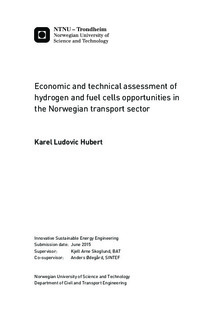Economic and technical assessment of hydrogen and fuel cells opportunities in the Norwegian transport sector
Master thesis
Permanent lenke
http://hdl.handle.net/11250/2356192Utgivelsesdato
2015Metadata
Vis full innførselSamlinger
Sammendrag
Because of the environmental pressure concerning both global and local pollution new ways of using energy are under study. Given that the Norwegian transport sector is a significant contributor to those pollutions at the national scale, the hydrogen and fuel cells technology is a potential solution thanks to its eco-friendly properties. This technology that allows transforming hydrogen and oxygen into electricity has many advantages but has also a cost, some drawbacks and has to be introduced properly in the transport market to insure the success of the energetic transition. By collecting information about existing projects and competitive fuels (diesel, battery, hydrogen and associated technologies) and by using the total cost of ownership as a comparative tool, the most relevant market segments to introduce fuel cells and hydrogen have been determined. This fuel comparison has been completed on a ferry, a light truck, a heavy truck and a car while other sectors have been covered more briefly. It appears that hydrogen has a significant advantage over batteries for medium and long distance trips as well as high energy consumption vehicles like heavy trucks. This advantage can even compete with diesel cars or light diesel trucks thanks to the Norwegian road tax exemption. However those applications are currently limited to captive fleet operation because of the lack of refueling infrastructure network. It has also been determined that, in the maritime sector, fuel cells are competitive with battery ferries for distances longer than 11.5 km. A simplified life cycle assessment also allows us to state that in addition to bring an undisputable CO2 emission reduction the replacement of diesel vehicle by a fuel cells vehicle also generates significant energy saving whatever the value chain used.
